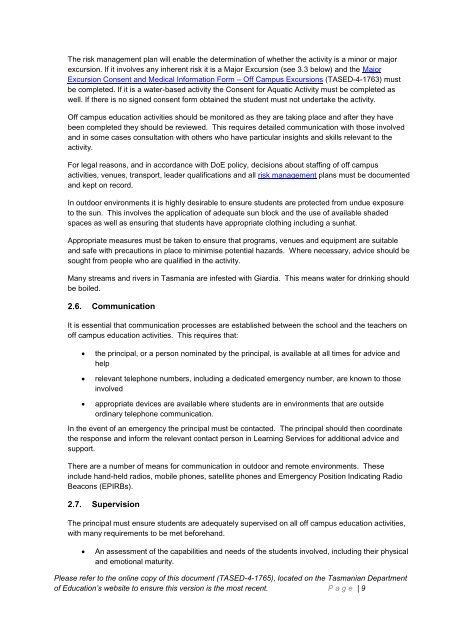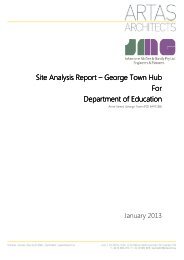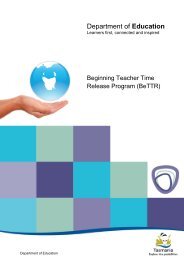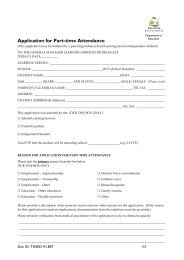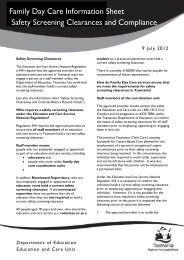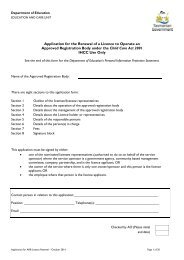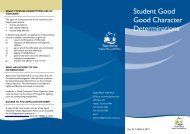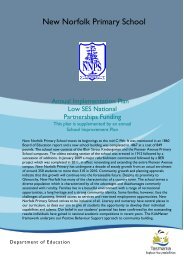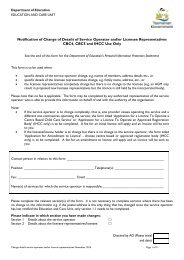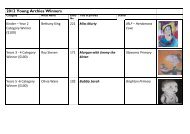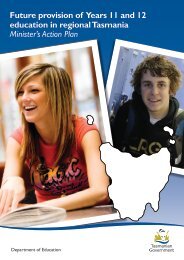PLANNING OFF CAMPUS ACTIVITIES
Procedures for Planning Off Campus Activities - Department of ...
Procedures for Planning Off Campus Activities - Department of ...
- No tags were found...
Create successful ePaper yourself
Turn your PDF publications into a flip-book with our unique Google optimized e-Paper software.
The risk management plan will enable the determination of whether the activity is a minor or major<br />
excursion. If it involves any inherent risk it is a Major Excursion (see 3.3 below) and the Major<br />
Excursion Consent and Medical Information Form – Off Campus Excursions (TASED-4-1763) must<br />
be completed. If it is a water-based activity the Consent for Aquatic Activity must be completed as<br />
well. If there is no signed consent form obtained the student must not undertake the activity.<br />
Off campus education activities should be monitored as they are taking place and after they have<br />
been completed they should be reviewed. This requires detailed communication with those involved<br />
and in some cases consultation with others who have particular insights and skills relevant to the<br />
activity.<br />
For legal reasons, and in accordance with DoE policy, decisions about staffing of off campus<br />
activities, venues, transport, leader qualifications and all risk management plans must be documented<br />
and kept on record.<br />
In outdoor environments it is highly desirable to ensure students are protected from undue exposure<br />
to the sun. This involves the application of adequate sun block and the use of available shaded<br />
spaces as well as ensuring that students have appropriate clothing including a sunhat.<br />
Appropriate measures must be taken to ensure that programs, venues and equipment are suitable<br />
and safe with precautions in place to minimise potential hazards. Where necessary, advice should be<br />
sought from people who are qualified in the activity.<br />
Many streams and rivers in Tasmania are infested with Giardia. This means water for drinking should<br />
be boiled.<br />
2.6. Communication<br />
It is essential that communication processes are established between the school and the teachers on<br />
off campus education activities. This requires that:<br />
<br />
<br />
<br />
the principal, or a person nominated by the principal, is available at all times for advice and<br />
help<br />
relevant telephone numbers, including a dedicated emergency number, are known to those<br />
involved<br />
appropriate devices are available where students are in environments that are outside<br />
ordinary telephone communication.<br />
In the event of an emergency the principal must be contacted. The principal should then coordinate<br />
the response and inform the relevant contact person in Learning Services for additional advice and<br />
support.<br />
There are a number of means for communication in outdoor and remote environments. These<br />
include hand-held radios, mobile phones, satellite phones and Emergency Position Indicating Radio<br />
Beacons (EPIRBs).<br />
2.7. Supervision<br />
The principal must ensure students are adequately supervised on all off campus education activities,<br />
with many requirements to be met beforehand.<br />
<br />
An assessment of the capabilities and needs of the students involved, including their physical<br />
and emotional maturity.<br />
Please refer to the online copy of this document (TASED-4-1765), located on the Tasmanian Department<br />
of Education’s website to ensure this version is the most recent. P a g e | 9


